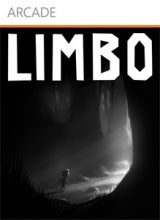A distinct lack of music punctuates my latest escape, as it has punctuated everything that's come before and everything that will come after. With my tormentor in hot pursuit, I barrel toward what passes for freedom in Limbo's eerie, ethereal, black-and-white world. After I'm forced to use the spider's weight to seesaw myself up a high cliff wall (by way of a precariously placed log), and after I deliver a decisive blow thanks to a handy boulder, the creature feebly limps toward me, with but a single razor-sharp leg still attached to its shadowy body. It uses the last of its strength in an attempt to skewer me, as it has tried many times before. Now it is nothing but a pitiful dead thing, and I forcibly pluck its final leg before rolling the husk into a pit and using it as a platform. I press onward, toward the next grisly predicament.

I do not know what I am doing, why I am here, or where I am going. If Xbox Live's description is anything to go by, I am a boy who has entered Limbo -- literally defined as the oblivion that borders Heaven and Hell -- in search of my lost sister. When I first pressed start, I awoke in a forest, with no opening scene, no dialogue, no tutorial, and nothing to help me make sense of the situation at hand. I was lost in a nightmare world where giant spiders chased me, faceless and unknown people (feral natives?) wanted to hurt me, and violent ends lurked at every turn. Without one word of exposition, Limbo communicated everything I needed to know through its tone, its visuals, and the careful relationship that its puzzle-based platforming deftly built with me.
As a game and a narrative, Limbo is aggressively preoccupied with violence, death, and primal fear. The game's clean, colorless visual style makes it feel like some sort of shadow puppet theatre; perhaps this is why the spider, all the hanging corpses, and the countless skewerings and decapitations (most of them at my expense) seem so chilling. After all, one of the most effective rules of horror is that it's scarier when you don't see the vile thing that's about to kill everyone. In this world, threats effectively take the form of shadows on a wall, feeding my mind just enough information to construct its own vision of terror -- and then using that terror to teach via traumatic experience. Every gruesome death the nameless boy suffers (all in the name of communicating the game's rules) is dreadful and sickening, more real and violent than the worst acts of carnage perpetrated in the Mortal Kombats and Dooms of the world. Limbo is simultaneously one of the most captivating, disquieting, creative, and morbid pieces of entertainment I have ever consumed.

Two, maybe three hours in -- roughly three-quarters of the way through the game -- I've entered the mines underneath a ruined city, where I navigate a series of spinning rooms. I use my momentum to catch lifesaving chain-ropes that dangle precariously close to lethal circular saws. As the chamber's movement reaches a half-revolution, I drop to the former ceiling and push a handy box down what's about to become a steep incline; I ride the makeshift surfboard toward a giant buzzsaw and leap to another chain in the nick of time. Well, eventually, anyway -- I die once or twice during the process, my tiny body hacked to kibble (with a gory crunch for that extra ick-factor). A little later, after I ride a mine cart down pitch-black corridors, I'm forced to consider my vehicle's momentum as I position it so as to afford myself maximum foot-travel time before the cart activates an electrified floor.
In these cases and countless others, Limbo uses its physics to provide subtle context on the nature of the world. It's empowering when you realize that your instincts are correct (or, at worst, on the right track) when it comes to hashing out a tricky puzzle; in many ways, this is counterintuitive to how more complicated games have taught us to think. Limbo, with its elegant simplicity, offers up what feels like a world of meaningful possibilities.
It's inevitable that Limbo will be compared to 2008's Braid, but I think this game's sum takeaway is more in line with Portal -- an intricate and internally consistent world that communicates itself through simple mechanics and a creative, minimalist structure on which to hang events that happen to a vulnerable protagonist. As a videogame, Limbo defines its medium in much the same way that I believe Watchmen defines comics and Memento defines film. If you enjoy games in any capacity, I urge you to let Limbo into your life.




 Outstanding!
Outstanding!


